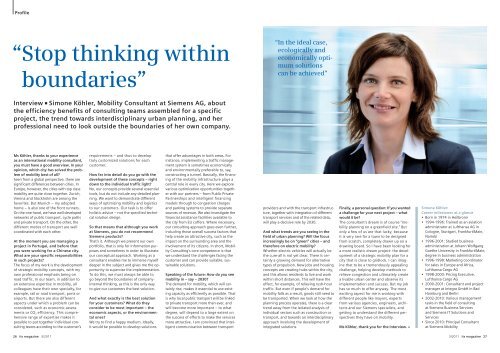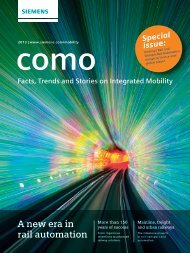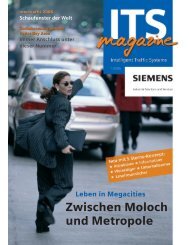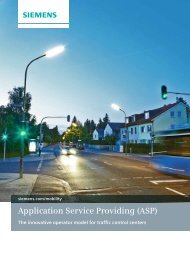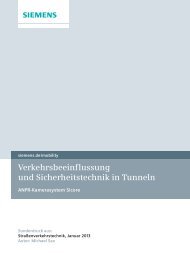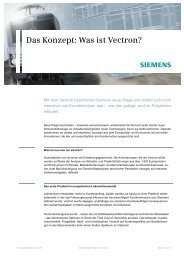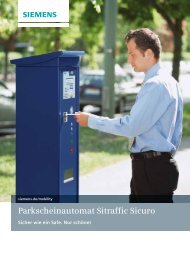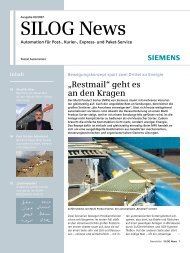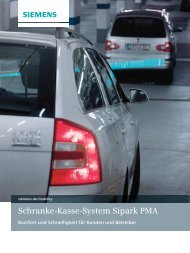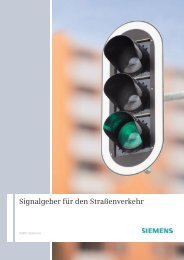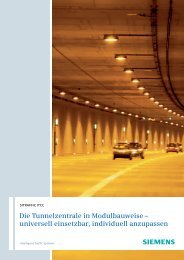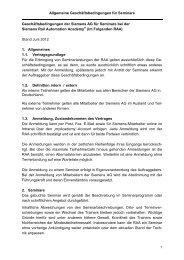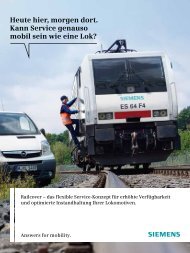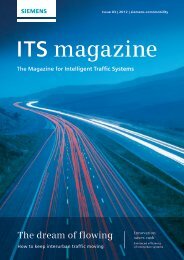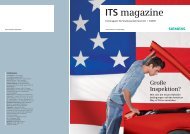You also want an ePaper? Increase the reach of your titles
YUMPU automatically turns print PDFs into web optimized ePapers that Google loves.
Profile<br />
“ Stop thinking within<br />
boundaries”<br />
Interview n Simone Köhler, <strong>Mobility</strong> Consultant at <strong>Siemens</strong> AG, about<br />
the efficiency benefits of consulting teams assembled for a specific<br />
project, the trend towards interdisciplinary urban planning, and her<br />
professional need to look outside the boundaries of her own company.<br />
Ms Köhler, thanks to your experience<br />
as an international mobility consultant,<br />
you must have a good overview. In your<br />
opinion, which city has solved the problem<br />
of mobility best of all?<br />
Seen from a global perspective, there are<br />
significant differences between cities. In<br />
Europe, however, the cities with top class<br />
mobility are quite close together. Zurich,<br />
Vienna and Stockholm are among the<br />
favorites. But Munich – my adopted<br />
home – is also one of the front runners.<br />
On the one hand, we have well developed<br />
networks of public transport, cycle paths<br />
and private transport. On the other, the<br />
different modes of transport are well<br />
coordinated with each other.<br />
At the moment you are managing a<br />
project in Portugal, and before that<br />
you were working for a Chinese city.<br />
What are your specific responsibilities<br />
in such projects?<br />
The focus of my work is the development<br />
of strategic mobility concepts, with my<br />
own professional emphasis being on<br />
road traffic. In our team, in addi tion to<br />
an extensive expertise in mobility, all<br />
colleagues have their own specialty, for<br />
example, rail or road transport, ports or<br />
airports. But there are also different<br />
aspects under which a problem can be<br />
considered, such as economic assessments<br />
or CO2 efficiency. This comprehensive<br />
range of expertise makes it<br />
possible to put together individual consulting<br />
teams according to the customer’s<br />
requirements – and thus to develop<br />
truly customized solutions for each<br />
customer.<br />
How far into detail do you go with the<br />
development of these concepts – right<br />
down to the individual traffic light?<br />
No, our concepts provide several essential<br />
tools, but do not include any detailed planning.<br />
We want to demonstrate different<br />
ways of optimizing mobility and logistics<br />
to our customers. Our task is to offer<br />
holistic advice – not the specified technical<br />
solution design.<br />
So that means that although you work<br />
at <strong>Siemens</strong>, you do not recommend<br />
<strong>Siemens</strong> products?<br />
That’s it. Although we present our own<br />
portfolio, that is only for information purposes<br />
and sometimes in order to illustrate<br />
our conceptual approach. Working as a<br />
consultant enables me to immerse myself<br />
deeper in the subject and gives me the opportunity<br />
to supervise the implementation.<br />
To do this, we must always be able to<br />
go beyond the boundaries of company-<br />
internal thinking, as this is the only way<br />
to give our customers the best solution.<br />
And what exactly is the best solution<br />
for your customers? What do they<br />
consider to be most important – the<br />
economic aspects, or the environmental<br />
ones?<br />
We try to find a happy medium. Ideally,<br />
it would be possible to develop solutions<br />
that offer advantages in both areas. For<br />
instance, implementing a traffic management<br />
system is sometimes economically<br />
and environmentally preferable to, say,<br />
constructing a tunnel. Basically, the financing<br />
of the mobility infrastructure plays a<br />
central role in every city. Here we explore<br />
various optimization opportunities together<br />
with our partners – from Public Private<br />
Partnerships and intelligent financing<br />
models through to congestion charges<br />
and parking systems to provide separate<br />
sources of revenue. We also investigate the<br />
financial assistance facilities available to<br />
the city from EU coffers. Where necessary,<br />
our consulting approach goes even further,<br />
including those overall success factors that<br />
help create an attractive city, such as the<br />
impact on the surrounding area and the<br />
involvement of its citizens. In short, <strong>Mobility</strong><br />
Consulting’s core competence is that<br />
we understand the challenges facing the<br />
customer and can provide suitable, sustainable<br />
solutions.<br />
Speaking of the future: How do you see<br />
mobility in – say – 2<strong>03</strong>0?<br />
The demand for mobility, which will certainly<br />
rise, makes it essential to use existing<br />
capacity as efficiently as possible. That<br />
is why local public transport will be linked<br />
to private transport more than ever, and<br />
will become more important – to what<br />
degree, will depend to a large extent on<br />
the success of efforts to make the services<br />
more attractive. I am convinced that intelligent<br />
communication between transport<br />
“ In the ideal case,<br />
ecologically and<br />
economically optimum<br />
solutions<br />
can be achieved”<br />
providers and with the transport infrastructure,<br />
together with integration of different<br />
transport services and of the related data,<br />
will play a decisive role by 2<strong>03</strong>0.<br />
And what trends are you seeing in the<br />
field of urban planning? Will the focus<br />
increasingly be on “green” cities – and<br />
therefore on electric mobility?<br />
Whether electric vehicles will actually be<br />
the cure-all is not yet clear. There is certainly<br />
a growing demand for alternative<br />
types of propulsion. New jobs and housing<br />
concepts are creating hubs within the city,<br />
and this allows residents to live and work<br />
within short distances. This will have the<br />
effect, for example, of relieving rush-hour<br />
traffic. But even if people’s demand for<br />
mobility falls as a result, goods still need to<br />
be transported. When we look at how the<br />
planning process operates, there is a clear<br />
trend away from the isolated analysis of<br />
individual sectors such as construction or<br />
transport, and towards an interdisciplinary<br />
approach involving the development of<br />
integrated solutions.<br />
Finally, a personal question: If you wanted<br />
a challenge for your next project – what<br />
would it be?<br />
The consultant’s dream is of course “mobility<br />
planning on a greenfield site.” But<br />
only a few of us are that lucky, because<br />
it is very rare for a town to be designed<br />
from scratch, completely drawn up on a<br />
drawing board. So I have been looking for<br />
a more realistic dream project: the development<br />
of a strategic mobility plan for a<br />
city that is close to gridlock. I can imagine<br />
that to be a tremendously appealing<br />
challenge, helping develop methods to<br />
relieve congestion and ultimately create<br />
a livable urban center and observe its<br />
implementation and success. But my job<br />
has so much to offer anyway. The most<br />
exciting aspect for me is working with<br />
different people like mayors, experts<br />
from various agencies, engineers, architects<br />
and our <strong>Siemens</strong> specialists, and<br />
getting to understand the different perspectives<br />
they have on mobility.<br />
Ms Köhler, thank you for the interview. «<br />
Simone Köhler:<br />
Career milestones at a glance<br />
• Born in 1974 in Heilbronn<br />
• 1994-1996: Trained as an aviation<br />
administrator at Lufthansa AG in<br />
Cologne, Stuttgart, Frankfurt/Main,<br />
Nairobi<br />
• 1996-2001: Studied business<br />
administration at Johann Wolfgang<br />
Goethe University in Frankfurt/Main;<br />
degree in business administration<br />
• 1996-1998: Marketing coordinator<br />
for sales in Europe and Africa,<br />
Lufthansa Cargo AG<br />
• 1998-2000: Pricing Executive,<br />
Lufthansa Cargo AG<br />
• 2000-2001: Consultant and project<br />
manager at Integra GmbH in Bad<br />
Homburg and Berlin<br />
• 2002-2010: Various management<br />
tasks in the field of consulting<br />
at <strong>Siemens</strong> Business Services<br />
and <strong>Siemens</strong> IT Solutions and<br />
Services<br />
• Since 2010: Principal Consultant<br />
at <strong>Siemens</strong> <strong>Mobility</strong><br />
26 its magazine 3/20<strong>11</strong> 3/20<strong>11</strong> its magazine 27


